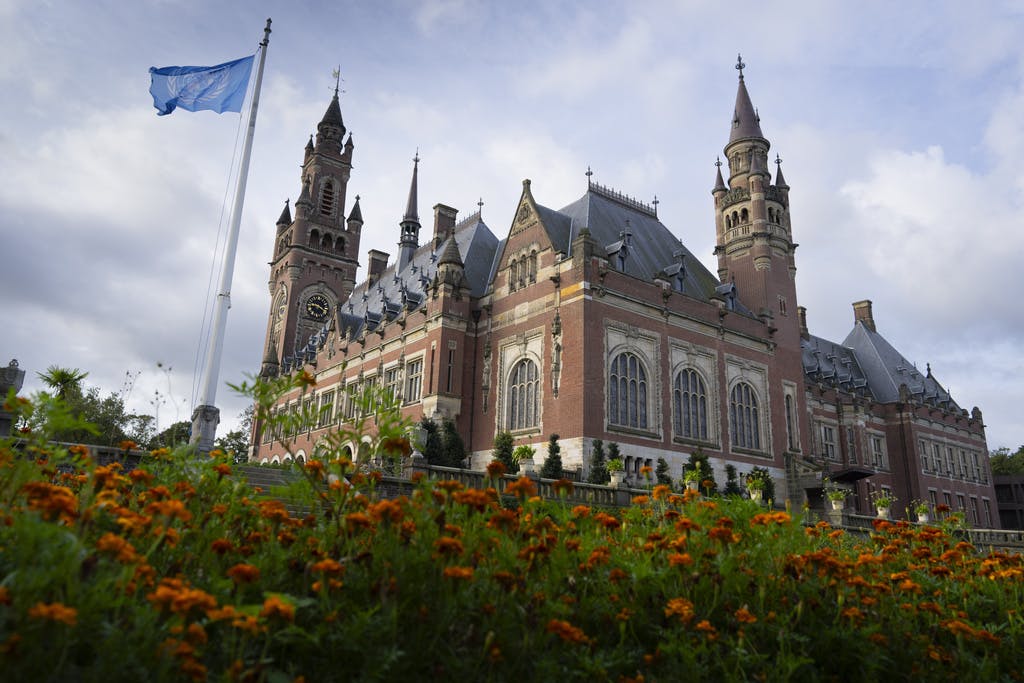Push for Recognition of Palestinian Arab State Widens as UN Court Looks Set To Rule Against Israel
Even as Ramallah is calling for ‘unity’ with Hamas, America is increasingly hinting it might recognize a state ruled by a ‘revamped’ Palestinian leadership, as well as pressuring Israel over its anti-terrorism tactics in the West Bank.

As America and others contemplate unilateral recognition of a Palestinian Arab state, the top United Nations judicial body is set to declare that Israel’s presence at the West Bank, Gaza, and Jerusalem is illegal.
A week-long deliberation in the International Court of Justice at the Hague opened Monday with the Palestinian Authority foreign minister, Riyad Maliki, accusing Israel of “colonialism and apartheid.” Its UN observer, Riad Mansour, called on the court to “confirm” that the occupation is illegal, and that Israel must leave the Palestinian territories.
As he often does, Mr. Mansour also teared-up, describing civilian suffering in Gaza. While the Hamas-launched war looms large over the Hague proceedings, though, they were launched two years ago, after the UN General Assembly asked the court to issue a non-binding opinion on how Israel’s settlements and its actions in the territories “affect the legal status of the occupation.”
Fifty countries are expected to opine this week, including America, a representative of which is scheduled to make a speech on Tuesday, likely in opposition to a negative court decision.
We are “deeply disappointed in the Palestinian-led initiative,” an American UN ambassador for political affairs, Robert Wood, said in a speech shortly after the Assembly voted overwhelmingly in 2022 to call on the ICJ to opine on the legality of the so-called occupation.
Now, even as Ramallah is calling for “unity” with Hamas, America is increasingly hinting it might recognize a state ruled by a “revamped” Palestinian leadership, as well as pressuring Israel over its anti-terrorism tactics in the West Bank.
Unable to turn territories under their control into a functioning state, the Palestinians are mobilizing world opinion to their side. The UN and its various organs are their friendliest allies. Ramallah diplomats endlessly use Turtle Bay processes to give anti-Israel General Assembly resolutions a legalistic veneer.
“Success at the UN depends on knowing its procedures,” a former deputy Israeli envoy there, Daniel Carmon, tells the Sun. “Process is the name of the game.”
In 2004 Israel erected a barrier that separated it from parts of the West Bank, which ended a months-long murderous terrorist campaign. Under Palestinian pressure, the General Assembly called on the ICJ to declare that “wall” unlawful. The court, indeed, advised that the “illegal” barrier must be dismantled. Israel ignored the non-binding ruling.
At this time, Israel “does not recognize the legitimacy of the proceedings of the international court in The Hague regarding ‘the legality of the occupation,’” Prime Minister Netanyahu’s office said in a statement Monday. The proceedings, it added, “are part of the Palestinian attempt to dictate the results of the diplomatic settlement without negotiations.”
While a pushback against hostile UN bodies is par for the course for Israel, it is increasingly concerned about statements from traditional allies. After initially sympathizing with Israelis in the aftermath of the October 7 Hamas atrocities, America and others are now indicating they may reverse past policies as they pressure Israel to support Palesinians state rights.
The 2022 General Assembly decision to ask the ICJ’s opinion on Israel’s “occupation” was “counterproductive and will only take the parties further away from the objective we all share of a negotiated two-state solution,” the American Mr. Wood said at the time.
That was then. Now, Department of State officials say in press leaks that they may recognize a Palestinian state without negotiations if it advances a Saudi-Israeli peace treaty. Britain is going even further: A unilateral recognition of a Palestinian state “could be something that we consider” to “advance a solution,” London’s foreign secretary, David Cameron, said recently.
Pushing back, the American ambassador to Israel, Jack Lew, denied that President Biden is weighing a unilateral recognition of a Palestinian state. “We have never said that was our policy,” he told the Conference of Presidents of Major Jewish Organizations Sunday at Jerusalem. Yet, he added, “our policy is that there should be an over-the-horizon process.”
The Knesset is expected on Wednesday to adopt by a wide margin the Israeli government’s statement that it “outright rejects international dictates regarding a final status agreement with the Palestinians.” Such a status, it added, can only be obtained “through direct negotiations between the parties, without preconditions.”
An overwhelming majority of Israelis fears that a Palestinian state now would reward terrorism and that if formed, it would be ruled by Hamas. Confirming such fears, the Palestinian Authority prime minister, Mohammad Shtayyeh, urged Hamas over the weekend to attend talks next week at Moscow, designed to incorporate Hamas into the leadership. “We need Palestinian unity,” Mr. Shtayyeh said.
In four months the international court of justice is widely expected to rule that Israel must leave areas it controls, including Jerusleam, in favor of a Palestinian state. Israelis will widely dismiss it as an attempt to support Hamas’s violence with faux-legal rulings.

